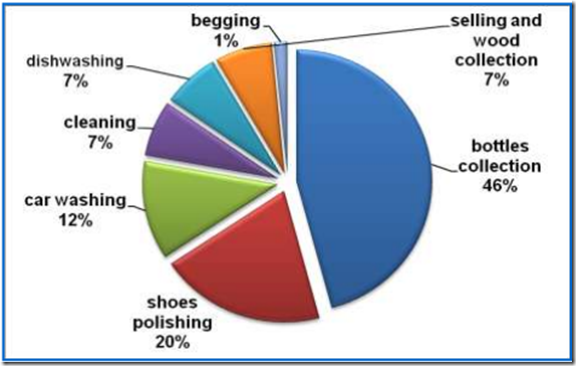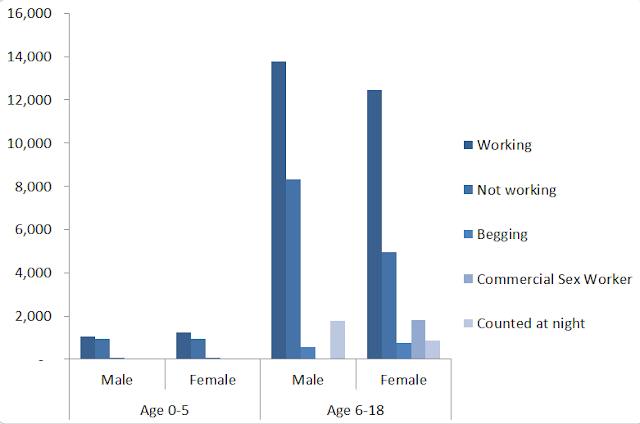So Abhijeet's paper is interesting and tells us something different, which should be applauded really just for finding a new angle to bring some attention to one of the most important but dull outrageous injustices there are. The conventional wisdom is that stunting in the first thousand days of life is irreversible. Abhijeet presents evidence to the contrary that giving children a meal every day at age 5 can fully make up for malnutrition due to a drought at age 1. So the policy conclusion is what - don't write-off malnourished children after a thousand days? Or how about maybe how on earth are we still letting children starve in the first place? Enjoy your lunch.
14 April 2025
You won't believe these 8,000 children who are actually going to starve to death today
So Abhijeet's paper is interesting and tells us something different, which should be applauded really just for finding a new angle to bring some attention to one of the most important but dull outrageous injustices there are. The conventional wisdom is that stunting in the first thousand days of life is irreversible. Abhijeet presents evidence to the contrary that giving children a meal every day at age 5 can fully make up for malnutrition due to a drought at age 1. So the policy conclusion is what - don't write-off malnourished children after a thousand days? Or how about maybe how on earth are we still letting children starve in the first place? Enjoy your lunch.
18 March 2025
The new childcare subsidy in the UK
"Today’s announcements indicate that the Government’s main motive is to help parents move into work. As we pointed out in the IFS 2014 Green Budget, we know remarkably little about the impact of the policies to support childcare that have been introduced in England in recent years. And there is no consistent evidence from other countries that childcare support has large effects on parental labour supply. While today’s announcements bring welcome simplifications to the new Tax-Free Childcare scheme, and an increase in generosity that will certainly be welcomed by families on Universal Credit using childcare, and better-off families who spend more than £6,000 a year on childcare, the extent to which it will deliver its intended goals is essentially unknown."and Chris Dillow:
"It's fitting that Nick Clegg should have announced an increase in the state subsidy for childcare, because the policy is a sanctimonious front for something that is inegalitarian and economically illiterate."
07 February 2025
Is it wrong to shop from places that use child labour?
12 December 2024
Development as.... development?
Funny how this path somehow led me to the latest international development focus on early child development goddamnit.
18 November 2024
Kinshasa Kids
Best aeroplane movie I've seen in a while, following the adventures of some street kids in Kinshasa who start a rap group.
Kid 1: What I want is to start a music band so I can escape to Europe.
Kid 2: I want to be a policeman so I can steal in peace.
Kid 3: Ah, you have to be a politician to steal with ease!
10 July 2025
How would you spend a billion dollars on children?
Jere Behrman: Start a program to improve information about education systems - including costs as well as impacts
Karthik Muralidharan:
1: appropriate curricula and pedagogical materials for teachers,
Lant Pritchett: The key is really moving political focus from access to learning outcomes. Do country studies which are a detailed plan of how to reach a set country-specific learning standard. Frame this as a problem that we can solve.
Paul Glewwe:
2. Pay for performance - e.g. cash on delivery for african gvts if they reach learning outcome standards
3: More Research
Pedro Carneiro: Need some solid plans from ECD people about practical details.
Richard Morgan (UNICEF): Coincidentally, exactly what UNICEF is doing now - including focusing on underexplored areas at this conference - child survival, stunting (with WASH as an input), and child protection.
The audience vote at the end was unclear (though apparently Richard got most of the non-economists...), so I'm stealing Duncan Green's polling habit - Make your choice in the side-bar!
---
Update: The final results:
Costas
|
0 (0%)
|
Jere
|
1 (5%)
|
Karthik
|
8 (40%)
|
Lant
|
4 (20%)
|
Orazio
|
1 (5%)
|
Paul
|
3 (15%)
|
Pedro
|
0 (0%)
|
Richard
|
2 (10%)
|
These are all rubbish, something totally different
|
1 (5%)
|
08 July 2025
Hey! Teacher! Leave them kids alone!
Matt has a post up on the clear highlight of the first day of Young Lives 2013 - the final plenary by Lant "Dude is so famous he doesn’t even bother wearing a name tag" Pritchett.
Pritchett’s point was fairly simple: in many settings school can be a pretty awful place to be, especially if the curriculum is moving faster than you can keep up with it. Eventually, all but a select few are left behind, leading to a “flattening out” of the learning curve. At this point, you can’t really learn anything when you are this far behind, so why stick around? At one point - and without warning - Pritchett presented an entire slide in Spanish, to give the audience a sense of how this must feel.The bottom line is really quite depressing - there are thousands and thousands of kids out there sitting in classrooms learning absolutely nothing.
The other highlight for me was Karthik Muralidharan's plenary - apparently one of the first papers to measure and illustrate the learning progress (or lack of) of individual children as they progress through school years - on a comparable ordinal scale. The approach is smart, borrowing from the "Item Response Theory" used in GRE tests, and allows you to estimate for example whether grade 5 students can answer grade 1 questions without having to ask them. The key policy take-away was that clearly we need more of this kind of testing being done with the same kids on an annual basis. At present, we have a few snapshot surveys of learning outcomes in random years in random countries, and almost nothing in most countries that can reliably tell you something meaningful about the progress that children are making. Part of this will hopefully be solved in a few years as countries sign up to a new post-2015 development goal on learning outcomes and then realise that they have committed to figuring out a way of actually measuring them. This stuff is important. As Karthik noted, all of the RCT randomista experimental literature looks at how much an intervention impoves treatment schools compared with control schools, but misses the larger point that nobody has a clue how much progress the control schools are making over time if any (as you might expect given general economic growth).
Naureen Karachiwalla and Abhijeet Singh both presented really interesting papers, documenting in detail the role of caste in determining learning outcomes in Pakistan, and differences between public and private schools in India, respectively (bottom line: they perform similarly, but private school teachers cost around a fifth of public school teachers so private schools are a lot cheaper to run).
The nonparametric bayesian econometrics (I think that's what it is...) was maybe a bit much for me first thing this morning, but the point to note for survey designers emphasised by Costas Meghir was that the cutting edge Heckman "latent factor" model tools for estimating human capital, cognitive and noncognitive skills, or whatever you want to call it, are data hungry. You need a few (at least 3) different measures of each concept that you are trying to proxy for.
That's all for now, time to sleep.
Young Lives 2013 (pre-match analysis)
First a bit of background: Young Lives is a project at Oxford University which is following thousands of children from Ethiopia, India, Peru, and Vietnam, talking to them and their households every 3 years for 15 years as they grow up, with quantitative and qualitative components. RCTs aside, this kind of longitudinal survey is pretty rare in developing countries to begin with, but in addition to all the standard demographic and socio-economic information, this survey also measures malnutrition, learning outcomes (language and maths), and asks the children directly about their experiences, hopes, and aspirations. (I just tried to see if I could download the actual questionnaire to see what the wording of the questions was, but apparently you need to be part of an academic institution to use the UK data archive where they are kept, which is a bit annoying).
The conference seems to be all economists, which I'm obviously not really going to complain about but it might have been interesting to see some of the fruits of the qualitative work. There are some really big names in the economics of education; Paul Glewwe, Lant Pritchett, Karthik Muralidharan, Jere Behrman, Stefan Dercon, and also some guy called Abhijeet Singh.
Now a bit of a quibble: the conference is organised around the theme of inequalities in children's outcomes. I remain unconvinced about the whole inequality narrative which is being pushed at the moment. You don't have to agree with Mankiw (I don't) to recognise that talking about inequality turns off a lot of people on the right. I still think the last UK Labour government made a great tactical move by tackling inequality and doing redistribution by defining child poverty by a measure of inequality. You can argue with caring about inequality, it's much harder to argue with caring about child poverty. But the focus here is not income inequality but inequality in outcomes. But in a sense isn't it still true that "we are all poor here?" Should we focus on the differences in health outcomes between the children who are only a bit malnourished and the ones who are totally stunted for life, or just despairing about how badly off they all are?
Finally, on my last count there were close to 60 papers being presented here, so we're going to struggle to even scrape the surface here, so do take a look yourself. I think the plan is also to stream the plenaries online. And just as a warning, if Matt is off his best blogging game today, you should cut him some slack, it might have something to do with all the rigorous qualitative research he was doing yesterday into the positive impact of post-war caribbean migration on contemporary British culture (the Cowley Road carnival in the baking heat yesterday might have been the best thing that has happened in Oxford in 1000 years, well worth missing Wimbledon for. So no pressure Young Lives but this conference better be good).
19 February 2025
The Girl Effect?
"Our analysis in this paper has highlighted several possibly important patterns in gender-based inequalities in the four study countries [Ethiopia, India (Andhra Pradesh), Peru, and Vietnam]. The most important of these is that there is no common thread that can be used to characterize gender inequalities across these different countries or indeed even across different dimensions of child well-being in the same country or across different ages.
we find no evidence of a common narrative of gender bias that is valid across all four countries and all dimensions; recognition of this heterogeneity in the patterns of inequality is, in our opinion, of central importance to effective policy-making, i.e., policy-making that is targeted toward reducing the specific biases that do exist in different contexts."From a new paper by Stefan Dercon and Abhijeet Singh
20 November 2024
Social protection in Congo (Brazzaville)
The Republic of Congo, also known as Congo-Brazzaville, is a country with striking contrasts between its status as an oil-rich, low middle-income country and its high levels of poverty and child deprivations. Social protection provision is largely limited to a small minority in the formal sector of the economy.
This paper presents the results of quantitative micro-simulations on the cost, impact and cost-effectiveness of different policy options for cash transfers in Congo, including universal and targeted child allowances, old-age pensions and disability benefits, along with an analysis of the existing social protection system, the policy framework and institutional capacity.
While a poverty-targeted child allowance would be the most cost-effective option, in terms of cost per unit of reduction in the poverty gap, institutional and technical constraints make large-scale poverty targeting unviable in a country with very weak governance. Universal categorical approaches would be much simpler to implement, while still being financially feasible given Congo's substantial fiscal surplus (14% on average in 2006-10). Under the assumptions employed for the simulation, a universal allowance for children under 5 would reduce the national poverty headcount by 9% while costing only 0.7% of GDP.
03 August 2025
Child-focused budgeting
John concludes:
"For donors looking to adopt a similar approach to UNICEF, there is an important underlying message: to achieve the changes in service delivery that many donors want to see - and governments themselves want to make - effective PFM systems must be in place first. These are the foundations for enabling wider, more sustainable social change, as the PFM approach ensures funding is aligned with policy priorities and long-term goals, rather than simply financing short-term projects, however superficially attractive these may be."See the full note (just 4 pages) here.
16 July 2025
Targeting the Hard-Core Poor
As The Economist reports;
Well after the financial help and hand-holding had stopped, the families of those who had been randomly chosen for the Bandhan programme were eating 15% more, earning 20% more each month and skipping fewer meals than people in a comparison group. They were also saving a lot. The effects were so large and persistent that they could not be attributed to the direct effects of the grants.What worries me is how scalable this programme is. That word "hand-holding" worries me. How many developing country governments have the resources and management capacity to arrange for a detailed skilled-labour-intensive personalised package of intensive support for every poor person? How many developed country governments have the capacity for that?
It worries me especially when there are so many easily scalable cost effective programmes out there that are not being funded. Why not focus first on the simple things that we know to work, like universal child grants or universal school meals, that can easily have a big impact on millions?
14 April 2025
Street kids in Sierra Leone
- In total there are just under 50,000 kids living and working on the streets in Sierra Leone.
- About half live in Freetown and half in other towns.
- There is a roughly even gender split with slightly more boys than girls.
- These kids make up around 5% of the urban population.
- 4,388 children under 6 years old were counted.
- 2,699 children were found sleeping rough.
- 1,821 under-age girls were recorded as working in the commercial sex industry.
- 633 disabled children were counted.
27 August 2024
More on Kids and Happiness
When I ask other people who would say their kids had made them always happy, they’d say they’d still have kids and the reason is they get meaning from them. Or some deeper sense of something or other. And so it turns out there’s more to life than happiness. That’s actually really important because if you go back and think about these happiness debates, people are saying politicians should target happiness. Well if we really believed that, the first thing we should do is have mass sterilization policies. Now it turns out that that’s an absurd suggestion. And it’s absurd because there’s a whole bunch of other things we also care about. Now what that suggests is not that the happiness project is- is wrong and needs to stop, but it suggests that it needs to expand and start to take account of these other things. These crazy things that make us do things like go out and have kids.I'd be interested to hear Justin's suggestions for how the UK should build on the new list of happiness questions to be included in national surveys.
- Overall, how satisfied are you with your life nowadays?
- Overall, how happy did you feel yesterday?
- Overall, how anxious did you feel yesterday?
- Overall, to what extent do you feel the things you do in your life are worthwhile?
04 August 2025
Why do economists have kids?
I would like to believe Bruce Sacerdote when he gives the very rational explanation
"I realised - this is the greatest adventure ever... Its so interesting..."
"I started getting what psychologists call baby fever",and Steve Levitt:
"Just because I'm an economist, doesn't mean I cant be fooled by evolution like everyone else."
19 June 2025
In which Mickey Mouse sells amphetamines to Africans
….Yes you read that correctly. This is what kids’ comics looked like in 1951. They don’t make ‘em like they used to.
HT: Kash Ramli
18 June 2025
The Child Labour Market in Juba
This chart comes from a fascinating new report on Child workers in Juba.
Economic Activities of Children working on the streets in Juba.

I’m really torn on whether it is a good idea to give money to these kids or not. They are usually around outside the Ministries washing cars, and polishing shoes at the local cafes. It seems like a classic aid problem of weighing the direct benefit vs the indirect harm. Is the meal today worth more than the disincentive to attend school?
I’ve tried to do a bit of homework (er, googling), and one of the foremost experts on the economics of child labour seems to be Kaushik Basu, previously a professor at Princeton and now Chief Economic Adviser to the Government of India (he has written a book on the subject - see here for the review on Marginal Revolution). Sadly though all I can really find are government policy recommendations, with no suggestions for the concerned individual (although there are some general concerns about potentially perverse impacts of well-meaning trade boycotts at the national level.
Any ideas?
Finally back to that report. It doesn’t tell us how many of their interviewees just work on the streets, and how many live there too. It doesn’t tell us how the questions were worded. It doesn’t have any cross-tabulations. Next time I would recommend paying a visit to the SSCCSE for some statistical advice.
29 January 2025
Suburban Superstar
"MORRNNINNGGG!!!!!!"
And the kids who stand shyly by the path until the car window is exactly level with them whereupon they scream with all their enthusiasm and might,
"MORRNNINNGG!!!!!!"
It's slightly less impressive on the evening commute, when despite the apparent passing of the day, the cry is still, a screeching, wholehearted, joyful, "morning". One day they will scream
"EVENINNGGG!!!!!"
and I will be very happy.
26 November 2024
Charity Christmas Card Edition
Perhaps a little early, I just received, an invitation to buy christmas cards from Jacari.
"Jacari is a student-run charity providing home teaching for children living in Oxford. These children, who are between 4 and 16 years old, do not speak English as their first language and often come from refugee families and those seeking asylum. University students volunteer to help improve their allotted child's English and performance in other subjects as required."I spent an hour a week for about 3 months reading with a kid and helping him with his maths homework. The improvement in his ability and enthusiasm for reading was noticeable every week.
Fantastic organisation. I am amazed that it hasn't been scaled up. The government should mandate this for all university students who want any kind of government subsidy.
27 April 2025
Winning arguments with science
"When you don't have children - as I don't, thus far - one entertaining thing to do with friends who do is as follows. Wait until they're gazing, lovestruck, into the eyes of their newborn baby, tucking their toddler into bed or proudly watching their 21-year-old graduate. Then creep up behind them, slap down a copy of the Journal Of Marriage And Family, vol 65, no 3, and triumphantly declare: "Ha! You may think parenthood has changed your life for the better, but, in fact, the statistical analyses contained herein, along with numerous other studies, demonstrate conclusively that having children makes people, on average, slightly less happy than before!" Then walk away cackling. They may never speak to you again, but that won't matter: you will have won the argument, using Science."







-762550.jpg)
